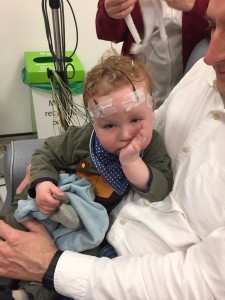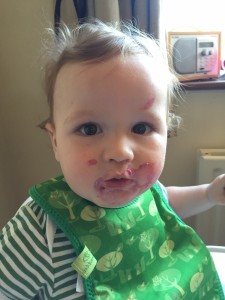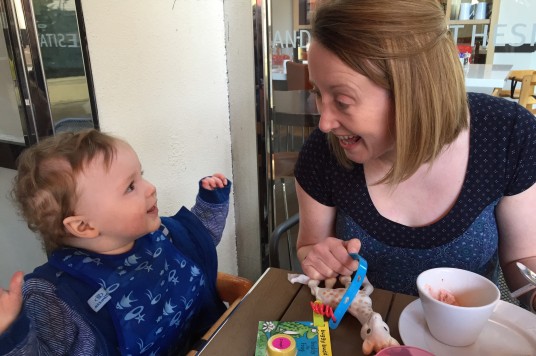Ketogenic diet is key to Harry’s health
Anna and Tom Gorrell were thrilled when their son Harry was born in March 2014. Weighing 7lb 10oz with brown hair he appeared healthy and happy.
However, when Harry turned four months old he started to experience seizures. At first it was only a few but as the days passed the number increased and soon Harry was suffering over 100 seizures every day.
Doctors noted that Harry’s development had slowed and he was lethargic. He was given epileptic medication in an attempt to manage his seizures but it had little benefit, leaving Anna and Tom feeling helpless and fraught with worry for their son.
In August 2014 Harry was referred to St George’s where he underwent a neurological assessment by Dr Antonia Clarke. Tests confirmed that Harry suffered from Glut1 deficiency syndrome.
Glut1 deficiency syndrome is a very rare genetic disorder where glucose isn’t transported properly into the brain so it is starved of the fuel it needs to grow and function. Approximately 500 people in the world are thought to have a Glut1 deficiency with symptoms ranging from seizures, movement disorders and development delays. Currently there is no cure.
With Harry not being able to use carbohydrates to fuel his brain, Dr Clarke referred him to Nicole Dos Santos, St George’s principal paediatric dietitians so that she could introduce and implement the ketogenic diet for Harry and his parents, the only recognised treatment for Glut1 deficiency syndrome.
The ketogenic diet is very high in fat (90% compared to 35% in normal diets) and low in carbohydrate. This ratio forces the body to use fat for fuel. The diet was first pioneered in the 1930s and over the years research has shown that by providing brain cells with ketones (the fuel obtained from metabolising fat) instead of glucose (the fuel obtained from metabolising carbohydrate) patient’s with epileptic symptoms can see their seizures reduced or even in some cases eradicated entirely.
Nicole met with Anna and Tom to explain what the diet entailed, how it worked, how it would be introduced, how Harry would be closely monitored and how she would be there every step of the way to answer any questions or concerns they had.
She taught them how to take Harry’s blood twice a day to measure the ketones in his body and gave guidance in how to recognise the symptoms of ketone levels becoming too high as they can be toxic and cause significant illness.
Harry was given a dietary prescription setting out the fat, protein and carbohydrate he could have in each meal and Nicole helped explain the process of weaning him onto special, high fat prescription ketocal milk. She also gave Anna and Tom access to a specialist computer program so that they could begin to create their own meal plans for Harry as he got older.
Anna and Tom felt reassured that the diet was safe and at only five months old Harry entered ketosis when, as if by magic his seizures stopped immediately. Nine months on they have not returned. Harry is now seizure free, making huge progress developmentally and is a happy, alert little boy.
Anna said “It was a terrifying month, not knowing what was wrong with our little boy or how to help him.
“I’d never heard of the ketogenic diet so when we got the diagnosis and were told it was the only treatment it was a lot to get my head round.
“Now, nine months on preparing the meals feels like second nature, and I’ve even set up a blog of my ketogenic recipes to help other babies in the same situation.
“None of this would have been possible without the incredible doctors at St George’s who diagnosed Harry so quickly and gave us access to the specialist dietitian support that is absolutely essential for the diet to work and be safe”
There are 16 centres in the UK that offer the ketogenic diet for children with epilepsy, in whom anticonvulsive medications have failed to control their seizures. Currently 30 patients at St George’s are on the specialised diet as a mechanism for managing their epileptic symptoms. Nicole manages and is part of a team of three dietitians, including Abbie Swancott and Fayth Armitage who support these patients and their families.
Nicole said “I cannot stress enough the need for these diets to be implemented and monitored by an experienced Dietitian. The diet is a medical treatment and if not implemented correctly can be harmful.
“Each child’s dietary prescription is unique and, as it is an unnatural diet it must be closely monitored and supplemented to ensure normal growth and development.
“Many parents feel powerless when their child is suffering, I am passionate about this diet as, with other areas of paediatric dietetics, it enables the parents to play a leading role in their child’s treatment.
“I am delighted that the diet has worked for Harry and that he will be able to live his life to its full potential. As a healthcare professional it is extremely fulfilling to be able to make a difference to the lives of children and their families. This is why we do what we do, and I am privileged to be in this position.”




